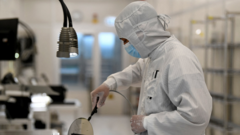How Did Broncos' Singleton Balance Nine Tackles and Cancer Surgery in Just Two Days?

Published: 2025-11-11 00:00:18 | Category: sport
Denver Broncos linebacker Alex Singleton recently made headlines after playing in a crucial game against the Las Vegas Raiders, despite being diagnosed with testicular cancer just days prior. Singleton underwent surgery to remove a cancerous tumour and has since expressed optimism about his recovery and the importance of early detection in health.
Last updated: 27 October 2023 (BST)
What’s happening now
Alex Singleton's recent diagnosis of testicular cancer has drawn attention not only to his personal struggle but also to the broader significance of health awareness in sports. After undergoing surgery to remove a cancerous tumour, Singleton played a pivotal role in the Broncos' 10-7 victory over the Raiders. His determination to compete despite serious health concerns showcases the resilience often displayed by professional athletes. Singleton's story serves as a poignant reminder of the importance of health screenings and awareness, especially for young men.
Key takeaways
- Alex Singleton was recently diagnosed with testicular cancer.
- He underwent surgery to remove a tumour and is expected to recover well.
- Singleton emphasises the importance of early detection and regular health screenings.
Timeline: how we got here
Singleton's health concerns began over two weeks ago when a routine drug test revealed elevated levels of the hormone human chorionic gonadotropin (hCG). Following this, he visited a urologist who performed an ultrasound, leading to the diagnosis of testicular cancer. His surgery took place on a Friday, and he played the following game against the Raiders, illustrating his commitment to the team and his recovery.
What’s new vs what’s known
New today/this week
Singleton's public announcement about his condition and his successful surgery are recent developments. His optimistic outlook regarding recovery and return to play has been an encouraging update for fans and teammates alike.
What was already established
Prior to his diagnosis, Singleton was a key player for the Broncos, known for his defensive skills and leadership on the field. The significance of his health issue highlights ongoing concerns about player health in the NFL, particularly regarding cancers that can affect younger athletes.
Impact for the UK
Consumers and households
While Singleton's situation is specific to American football, it resonates widely, including in the UK, where awareness of health issues, particularly among young men, is crucial. Campaigns promoting regular health check-ups can significantly influence public health outcomes.
Businesses and jobs
For franchises and organisations, health-related stories such as Singleton's can impact player management and health policy. Teams may be more encouraged to enhance their health screening protocols for athletes, potentially leading to better overall health outcomes.
Policy and regulation
Singleton's case could spur discussions around health policies within sports organisations, including the NFL and similar leagues in the UK, focusing on early detection and support for athletes facing health challenges.
Numbers that matter
- Testicular cancer is the most common cancer in men aged 15 to 49.
- Early detection through regular screenings can lead to a 95% cure rate.
- Singleton made nine tackles in his last game before surgery, showcasing his performance even amidst personal challenges.
Definitions and jargon buster
- hCG (human chorionic gonadotropin): A hormone that can indicate testicular cancer when elevated in men.
- Testicular cancer: A type of cancer that originates in the testicles, which is often treatable if caught early.
How to think about the next steps
Near term (0–4 weeks)
Singleton is expected to rest and recover from surgery while awaiting further test results. His focus will likely be on rehabilitation and monitoring his health closely.
Medium term (1–6 months)
As he recovers, Singleton's return to training and eventual games will be closely watched. His experience may lead to advocacy for health awareness in sports.
Signals to watch
- Updates on Singleton's health and return to play.
- Increased discussions around health screenings in sports, particularly for younger athletes.
Practical guidance
Do
- Schedule regular health check-ups and screenings, especially for young men.
- Pay attention to any unusual changes in your body and seek medical advice when necessary.
- Educate yourself about the signs and symptoms of testicular cancer.
Don’t
- Ignore changes in your body, thinking they are unimportant.
- Delay seeking medical advice if you notice something unusual.
Checklist
- Have you had a recent health check-up?
- Do you regularly perform self-examinations for testicular health?
- Are you aware of the symptoms of testicular cancer?
Risks, caveats, and uncertainties
While Singleton expresses optimism about his condition, individual experiences with cancer can vary significantly. Early detection is crucial, but there are still risks associated with the type and stage of cancer. Singleton's public discussion of his health should not replace professional medical advice for individual cases.
Bottom line
Alex Singleton's journey underscores the critical importance of health awareness and early detection in sports. His story serves as a reminder for everyone, especially young men, to prioritise their health and seek regular screenings. As Singleton recovers, his experience may inspire others to take charge of their health proactively.
FAQs
What is testicular cancer?
Testicular cancer is a type of cancer that begins in the testicles. It is most common among younger men and has a high cure rate if detected early.
How can I perform a self-examination for testicular cancer?
Self-examinations involve checking for lumps or changes in the testicles. It is best done after a warm shower when the skin is relaxed. Regular checks can help in early detection.
What should I do if I notice changes in my body?
If you notice any unusual changes, such as lumps or persistent pain, it is important to seek medical advice promptly. Early intervention can significantly improve outcomes.



